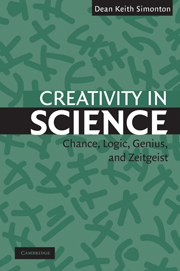Book contents
- Frontmatter
- Contents
- Preface
- Mathematical Notation
- Chapter 1 Introduction: Scientific Creativity
- Chapter 2 Creative Products
- Chapter 3 Combinatorial Processes
- Chapter 4 Scientific Activity
- Chapter 5 Creative Scientists
- Chapter 6 Scientific Discovery
- Chapter 7 Consolidation: Creativity in Science
- References
- Index
Chapter 6 - Scientific Discovery
Published online by Cambridge University Press: 05 June 2012
- Frontmatter
- Contents
- Preface
- Mathematical Notation
- Chapter 1 Introduction: Scientific Creativity
- Chapter 2 Creative Products
- Chapter 3 Combinatorial Processes
- Chapter 4 Scientific Activity
- Chapter 5 Creative Scientists
- Chapter 6 Scientific Discovery
- Chapter 7 Consolidation: Creativity in Science
- References
- Index
Summary
It is now necessary to look at the rival tradition in the psychology of science — the tradition that stresses the logic of scientific discovery. In contrast to the psychologists who apply correlational methods to study the disposition and development of creative scientists, these psychologists conduct laboratory experiments and computer simulations to study problem solving. Fittingly, the proponents of this experimental tradition are largely researchers in the cognitive sciences, most particularly cognitive psychologists and computer scientists. These investigators tend to be completely unsympathetic with, if not totally hostile toward, the genius perspective on creativity, scientific or otherwise. For instance, one advocate gave a book the provocative title Creativity: Beyond the Myth of Genius (Weisberg, 1992). Here the author flatly denies that creative individuals differ from noncreative individuals on any important cognitive or personality variable. In addition, he argues that creative thinking involves the same kinds of thought processes that everyone uses to solve everyday problems. Thus, no fundamental difference separates Einstein's thinking from that of his far less influential contemporary, Friedrich Hasenöhrl. Each applied deliberate, systematic, conscious, and logical processes to the domain knowledge he possessed.
Clearly, these assertions contradict not just the genius perspective but the chance perspective besides. This contradiction is made most explicit in the discovery programs that purport to simulate scientific creativity by a straightforward, step-by-step analysis of empirical data (Langley et al., 1987; Shrager & Langley, 1990; Wagman, 2000). Such computer simulations seem to include no provision for the introduction of chance.
- Type
- Chapter
- Information
- Creativity in ScienceChance, Logic, Genius, and Zeitgeist, pp. 137 - 159Publisher: Cambridge University PressPrint publication year: 2004



